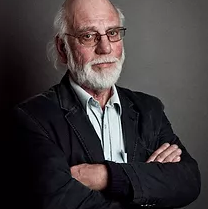- Bob Quinn
- Cinegael
- admin@conamara.org
DIRECTORS

Contact
Filmography
-
The Bishop's Story
1994 — Feature Film — 85 mins -
Budawanny
1987 — Feature Film — 70 mins -
Atlantean
1984 — Documentary -
Poitín
1978 — Feature Film — 65 mins -
Lament for Arthur Leary
1975 — Feature Film — 57 mins
James Thurber wrote of himself: ‘Easy to rouse, he is hard to quiet and people usually just go away.’
The same might be said of Bob Quinn.
Under the title ‘Cinegael’, and for nearly four decades, in words and images, Bob Quinn has recorded life in the West of Ireland, especially in the Conamara Gaeltacht. He has been called a ‘talented eccentric’ (by Ken Gray, Irish Times) a ‘maverick’ (by corporate RTE & the late Jim Kemmy). Hence the ‘Maverick’ title of his 2001 book on RTE. This is as good a way as any to approach him and his work. He has filmed and photographed from Tatarstan to Morocco, from India to the United States. His work has been exhibited from Galway to Los Angeles, from Moscow to Missouri. Apart from his film work, he has been published by Quartet Books (London & New York), O’Brien Press, (Dublin), Brandon Press, (Kerry), Lilliput Press (Dublin) and Cló Iar-Chonnacht, (Galway). Yet he has always remained on the periphery of mainstream critical consideration and by now has a status analogous to the smile of a Cheshire cat.
Born in Dublin and after seventeen different careers he became a television producer at the age of 27. In 1969, after a career in Irish public broadcasting, he opted for the James Joyce tactic of silence, exile and cunning. He succeeded in only one of these tactics – exile in Conamara. But in the process he has produced a respectable body of cinematic, literary and photographic work.
The film and video company, Cinegael, which with Seosamh Ó Cuaig and Toni Cristofides he founded in 1973, concentrated on the Gaeltacht of Conamara. Quinn still sees this Irish-speaking area in the West of Ireland as the grain of sand which, in the William Morris sense, contains and illuminates the world. Cinegael’s original intention was to reinforce the identity of this threatened linguistic minority: the group soon realised that in modern times man’s destiny is stated in political terms. Inspired by the the National Film Board of Canada’s Challenge for Change programme and using pioneering closed-circuit TV techniques it recorded local events and controversies. It mediated successfully between local opinion and public bodies.
Gradually Cinegael began to engage with the larger polity. It evolved into a maker of one-off film documentaries and dramas which were all screened on RTE, all well as on BBC, Channel Four, S4C, SBC etc. and which achieved other international recognition. In 1981 Quinn earned the Spirit of the Festival Award at the Celtic Film Festival. In 1984 he won a Jacob’s TV Award. In 2009 he was awarded the ‘Director’s Choice’ award at BIFF. There are so many Film Festivals in the world to-day that awards are as plentiful as snuff at a wake.
In 1988 he was the first film maker to be elected a member of Aosdána, the Irish Parliament of Artists. (In the same year he met Colonel Ghadafi.)
In 1995 he was surprisingly appointed as a member of the RTE Authority, from which position he resigned in 1999 and wrote the whistle-blowing Maverick, the first intimately-informed account of Irish Public Broadcasting. Since then the Irish Public Broadcaster has rejected all his programme proposals.
In 2001 he was given a Lifetime Achievement Award by the Irish Film Institute.
Quinn still lives and works in Conamara. He has six children and ten grandchildren. He has been planting trees since 1982. He rarely watches TV but devours radio. In what must be called his dotage (he is hopeless at anecdotage) he sings (basso profundo) Baroque music with St. Nicholas church choir and the Galway Baroque Singers.